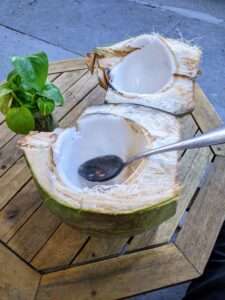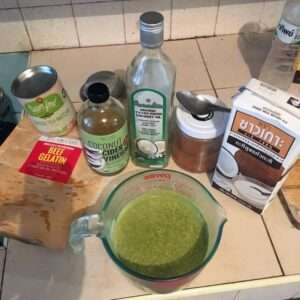Discover Coconut Health Benefits: Hydration, MCT Energy & More
Have you ever wondered about the true coconut health benefits hidden inside that big green shell?
Maybe nobody asks—until they find themselves sipping fresh coconut water under a Thai sun and realize this humble fruit might just be one of nature’s most versatile wellness hacks.
In this article, you’ll learn how coconut water, meat, milk, and oil each deliver unique perks—and I’ll share why going from Colorado to Costa Rica to Thailand completely changed my view on this tropical powerhouse.

I grew up in Colorado, where coconuts meant wrestling with a hard-brown shell bought in a crate at the grocery store. As a kid I remember my parents cracking one open as a novelty snack—dense white meat, cloudy water, and a lot of effort for a modest payoff.
Fast-forward to my first trip in 1998 to Costa Rica, where I watched a local split a green coconut in seconds with a machete. That fresh-off-the-tree experience was a revelation: sweet water, tender meat, and zero added sugar or processing. You can read more about my own health journey (and struggles!) here.
Then came Thailand—2018 to be exact—when I moved to Chiang Mai and made young coconuts part of my daily routine. I learned that ripeness matters: young coconuts are carb-rich and light, while mature ones pack more fat and calories. (Calories can swing by 1,000 kcal depending on age!)
Through self-experimentation, I discovered that eating loads of coconut didn’t make me fat—in fact, the fiber and medium-chain triglycerides often had the opposite effect.
Along the way, I’ve also built out a suite of Zen Strength offerings—from breathwork to ice baths to sleep masterclasses—that pair perfectly with simple biohacks like coconut hydration. Check out all upcoming Zen Strength events and workshops here.
In the sections that follow, we’ll dive into the
- nutrition facts,
- cooking applications,
- therapeutic uses, and
- science-backed anecdotes
that prove coconuts deserve a prime spot in your wellness toolkit.
Whether you’re curious about natural electrolytes, healthy fats, or just want a refreshing change from sugary sports drinks, you’re in the right place…
My Coconut Story: From Colorado Grocery to Thai Fruit Stands
Childhood Memories in Colorado
Growing up in Colorado, a coconut was a rare treat—a dark-brown sphere with a rock-hard shell and dense, chalk-white meat that tasted more like elbow grease than enjoyment. I still remember my parents wrestling with one in our kitchen, chipping away at the shell with every tool we owned until finally cracking through.
The payoff?
A few sips of cloudy water and a bite of ultra-rich flesh—worth the effort, but certainly nothing like the coconuts I know today.
Did you know?
Mature coconuts (the brown ones) can contain well over 1,000 kcal in the meat alone, whereas young green coconuts often clock in under 300 kcal—with a very different nutrition profile.
Costa Rica Epiphany
WAY back in 1997, on my first solo trip to Costa Rica, my brother, a friend, and I watched in amazement as a local peeled back the thick green husk and sliced open a young coconut in under 1 minute with a machete.
The water inside was sweet, barely cloudy, and ice-cold—a far cry from the grocery-store experience. The meat was soft, almost gelatinous, melting in your mouth instead of demanding a jaw workout. That moment planted the seed:
Coconuts aren’t all created equal.
I didn’t just taste the difference; I felt it. Hydrated after a long jungle hike, energized without the sugar crash, and intrigued by the idea that one simple fruit could do so much. That machete demo is one of those travel memories that sticks with you—and it reshaped my understanding of how food can connect us to place and culture.
Settling in Thailand (2018–Now)

When I came to Chiang Mai in 2018, ordering a young coconut became part of my daily rhythm. Vendors in the Old City would crack them open poolside at cafés, and I’d sip the water straight from the shell before scooping out the tender meat with a bamboo spoon.
Over time, I tracked how my energy, digestion, and hydration improved—and I started recommending coconuts to clients in my Zen Strength workshops (from breathwork + ice baths to sleep masterclasses).
Living here taught me the key: ripeness matters. Young coconuts are packed with electrolytes and light-digesting carbs—ideal for hot afternoons or post-sauna recovery—while mature coconuts deliver rich fats and fiber that keep you full longer. By embracing both, I’ve debunked the myth that “coconuts make you fat.” Instead, they’ve become a cornerstone of my nutrition—and a daily reminder of how changing context (and freshness) transforms everything.
Coconut Nutrition Facts: Macro & Micro Profile

Understanding coconut health benefits starts with breaking down what’s inside that shell. Below, we’ll explore each edible part—water, meat, milk, and oil—and highlight why they deserve a place in your diet.
Coconut Water Benefits
Coconut water is nature’s original sports drink.
Here’s what makes it stand out:
- Electrolyte Balance
Young coconut water delivers a mix of minerals – potassium, sodium, magnesium, and calcium – in ratios remarkably similar to human plasma. (ScienceDirect)
That’s why during World War II and the Vietnam War, medics sometimes used sterile coconut water as emergency IV fluid when conventional supplies ran low. (PubMed, 1999) - Low in Calories & Sugar
At roughly 45–60 kcal per cup, coconut water is significantly lighter than many commercial sports beverages—or fruit juices—making it an ideal post-workout or post-sauna refresher. According to USDA FoodData Central, 1 cup of shredded coconut provides ~7 g fiber and 283 kcal (FoodData Central) - Natural Hydration & Recovery
I offer fresh young coconuts at my Zen Strength Foundations workshops as a clean, whole-food hydration hack. The natural electrolyte blend helps replenish what you sweat out—without added sugars or artificial flavors. Coconut water is shown to have hydrating effects similar to those of carbohydrate-electrolyte sport drinks. (PMC, 2012)
Advantages of Coconut Water
- Rehydrates faster than plain water
- Supports muscle function and nerve signaling
- Contains cytokinins, plant compounds linked to anti-aging benefits
Read more about hydration hacks like this in our Sleep Masterclass and Biohacking events.↗️
Coconut Meat Benefits
When you scoop out that tender white flesh, you’re tapping into:
- Medium-Chain Triglycerides (MCTs)
Roughly 60% of coconut meat’s fat is MCTs, which your body readily converts into ketone energy—fuel for your brain and muscles without the insulin spike of carbs.
(Read about going KETO in Thailand here.) - Dietary Fiber & Satiety
A single cup of shredded coconut provides about 7 grams of fiber, promoting healthy digestion and helping you feel full longer. - Caloric Variance by Ripeness
- Young (green) coconut meat: ~150–200 kcal per cup, higher in simple carbohydrates
- Mature (brown) coconut meat: ~600–1,000 kcal per cup, packed with fats and fiber
Bullet List: Top 3 Health Wins from Coconut Meat
- Sustained energy from MCTs
- Improved gut health via fiber
- Natural, nutrient-dense snack
Coconut Cream and Coconut Milk Benefits
Made by blending meat (with water for coconut milk)—and then straining—the result is a creamy liquid rich in vitamins and bioactive compounds:
- Bone & Immune Support
Coconut milk is a source of manganese (essential for bone health) and lauric acid, an antimicrobial fatty acid shown to support immune function. Lauric acid, an antimicrobial fatty acid, has been shown to inhibit growth of pathogens in vitro. (PMC, 2019) - Dairy-Free, Vegan Alternative
For anyone with lactose intolerance or dairy sensitivities, coconut milk offers a luscious, naturally sweet swap—perfect in curries, smoothies, or your morning matcha latte. - Anti-Inflammatory & Skin Health
The antioxidants in coconut milk may help reduce inflammation and protect skin cells from oxidative stress.
“Is coconut milk good for you?”
Yes—coconut milk can provide essential nutrients, healthy fats, and a creamy texture without dairy allergens.
Coconut Oil Benefits
Extracted by pressing mature coconut meat, coconut oil is celebrated for its stability, versatility, and health-promoting fats:
- High Smoke Point
Refined coconut oil withstands temperatures up to 450°F, making it ideal for frying and sautéing without producing harmful oxidation byproducts. (Health) - Brain & Metabolic Fuel
The MCTs in coconut oil bypass the usual digestive pathway and travel directly to the liver, where they’re converted into ketones—an efficient energy source for cognitive function and metabolism. In my own self-experiments, combining coconut oil (or MCT oil) with morning coffee stabilized my energy and warded off mid-day cravings. (Healthline, 2023)
[Read about going KETO in Thailand here.] - Non-Culinary Uses
Beyond the kitchen, coconut oil shines as a moisturizer, hair mask, or natural lubricant.
“5 Surprising Uses for Coconut Oil”
- Oil pulling for oral health (read HOW here)
- DIY lip balm and body scrub
- Wood furniture polish
- Pet paw protector
- Makeup remover
With these macro and micro profiles in hand, you can see that coconuts aren’t just a one-dimensional snack—they’re a multipurpose wellness toolkit.
Cooking & Culinary Uses: Replacing Seed Oils with Coconut Oil
One of the simplest biohacks I’ve adopted here in Thailand is swapping pro-aging, ultra-processed (refined) seed oils for stable, health-promoting coconut oil in my everyday cooking. Here’s why and how to make the switch without sacrificing flavor or function.
Why Ditch Omega-6 Seed Oils?
Over the past decades, most processed foods—from salad dressings to snack chips—have shifted to high-omega-6 seed oils like soybean, corn, or sunflower oil.
While tiny amounts of omega-6 fats are essential, an excessive ratio of omega-6 to omega-3 has been linked to chronic inflammation, oxidative stress, and a host of metabolic issues (Harvard T.H. Chan School of Public Health).
But the bigger issues are around the stability of these oils. Your body uses the oils you consume in your cell membranes (you are what you eat!) and, these unstable oils not only make your cells weaker – they make YOU weaker – with less energy and more health issues.
You also store these oils as fat in your body for up to 2 years. Guess what happens when your body pulls these fat stores out for energy? It’s like you added sand to the gas tank of your car – it sputters and eventually stops running!
- Inflammation Driver: Seed oils oxidize easily at cooking temperatures, producing harmful compounds.
- Imbalanced Ratios: Modern diets can push omega-6 intake far beyond recommended levels (ideally a 4:1 or lower omega-6:omega-3 ratio).
- Easy Swap: Coconut oil is predominantly saturated fat, making it highly resistant to heat-induced oxidation.
By choosing coconut oil, you lower your intake of potentially toxic oxidation byproducts and restore a healthier fat balance—without overhauling your favorite recipes.
Best Ways to Use Coconut Oil
1. High-Heat Cooking & Frying
- Refined vs. Virgin:
- Refined coconut oil has a neutral flavor and smoke point up to 450°F, perfect for stir-frying vegetables or pan-searing meats.
- Virgin (unrefined) coconut oil, with its mild coconut aroma and smoke point around 350°F, excels in sautés or medium-heat applications.
- Pro Tip: Cook “low and slow” – lower heat preserves the nutrients – and damages the food less. Avoid exceeding oil’s smoke point—typically above 350 °F on stovetops—to preserve nutrients. (CSU College of Health and Human Sciences, 2020)
2. Baking & Sweet Treats
- Replace vegetable oil in muffins, pancakes, or cookie recipes with melted coconut oil and/or ghee.
- Zen Strength Scrambled Eggs: Here’s where you use high heat: Heat your frying pan (I use glass) with oil – then add your whipped eggs, wait 30-90s, turn off the heat, and scramble.
3. Flavor Infusion & Marinades
- Use virgin coconut oil as the base for tropical marinades: combine with lime zest, garlic, and Thai chili flakes for a quick fish or tofu marinade.
- Stir a spoonful of coconut oil into curries or soups at the end of cooking to enrich texture and absorb fat-soluble vitamins.
Sourcing & Quality Tips
- How to buy:
- Look for “virgin”
- Always buy in glass containers
- Label Checklist:
- No additives or preservatives
- “Cold-pressed” or “expeller-pressed” for maximum nutrient retention
By integrating coconut oil into cooking, baking, and flavor-boosting applications, you not only elevate the nutrient profile of your meals but also reduce your exposure to harmful compounds.
Beyond the Kitchen: Health Hacks with Coconut
Coconuts aren’t just for eating—they’re a Swiss Army knife of wellness tools. From supercharging your recovery to DIY skincare, here’s how I tap into every part of the coconut ecosystem outside of cooking.
Coconut oil hydrates dry skin effectively, though it may clog pores for some skin types. (Cleveland Clinic)
Coconut Water for Zeta Potential & Recovery
When you sweat through a Zen Strength Sauna + Breathwork + Ice Bath cycle, you lose more than just water—you deplete electrolytes and disrupt your blood’s zeta potential (its ability to stay unclumped and flow smoothly).
That’s where fresh young coconut water shines:
- Electrolyte Powerhouse
With a nearly perfect potassium-to-sodium ratio, plus magnesium and calcium, coconut water restores balance faster than plain water or most sports drinks. - Natural Zeta Booster
Coconut water’s ionic profile supports healthy blood flow.
Topical & Therapeutic Uses
Coconut oil and even the meat itself can level up your beauty and self-care routine with zero synthetic ingredients:
- Moisturizer & Skin Soother
- Warm a teaspoon of virgin coconut oil between your palms and gently massage it into dry areas—hands, elbows, or lips.
- User Tip Box: For an extra glow, mix 1 tsp coconut oil with ½ tsp finely ground sugar to create an exfoliating scrub. Rinse with warm water and pat dry.
- Hair Mask & Scalp Treatment
- Apply melted coconut oil from roots to ends, leave on for 20–30 minutes, then shampoo as usual. This simple treatment can reduce frizz, boost shine, and soothe an itchy scalp—perfect after long days teaching breathwork sessions. Two tablespoons of melted oil can strengthen hair and reduce breakage (Healthline, 2018)
- MCT-Derived Brain Fuel
- Many of our clients mention improved focus when they start their day with a tablespoon of coconut MCT oil blended into coffee or a smoothie. The rapid conversion of MCTs into ketones offers clean, sustained mental energy without jitters.
(Read about going KETO in Thailand here.)
- Many of our clients mention improved focus when they start their day with a tablespoon of coconut MCT oil blended into coffee or a smoothie. The rapid conversion of MCTs into ketones offers clean, sustained mental energy without jitters.
- Household & First-Aid Hacks
- A dab of coconut oil can calm minor skin irritations or insect bites—its mild antibacterial properties help keep wounds clean.
- Use excess oil to polish leather boots or condition wooden cutting boards—nature’s own multi-tool.
By leveraging coconut water for recovery and coconut oil/meat for topical and therapeutic uses, you’re turning a single fruit into a multi-purpose wellness ritual.
FAQs: Your Top Coconut Questions Answered
To wrap up our coconut deep-dive—and help you snag those “featured snippets” on Google—here are the most common questions about coconut health benefits, with concise, evidence-backed answers.
Q1: What are the benefits of drinking coconut water?
Coconut water hydrates faster than plain water thanks to its natural mix of potassium, sodium, magnesium, and calcium. At just 45–60 kcal per cup, it replenishes electrolytes lost during workouts, sauna sessions, or hot Thai afternoons—without the added sugars or artificial ingredients of commercial sports drinks.
Q2: Is coconut oil good for weight loss?
While mature coconut meat and oil are calorie-dense, their medium-chain triglycerides (MCTs) are metabolized quickly into ketones, which can boost metabolism and curb appetite. In my own self-experiment, swapping seed oils for coconut oil and adding MCT-rich coconut meat to meals helped stabilize energy levels and reduce cravings—not pack on pounds.
(Read about going KETO in Thailand here.)
Q3: How does coconut milk improve skin health?
Coconut milk delivers lauric acid (an antimicrobial fatty acid) and antioxidants that soothe inflammation and support skin barrier function. Used topically, it can calm dry patches and promote a radiant complexion; when consumed, it supplies vitamins and healthy fats that nourish skin from the inside out.
Q4: What’s the difference between a young vs. mature coconut?
- Young (green) coconuts: ~150–200 kcal per cup of meat; high in simple carbohydrates and electrolytes in the water—ideal for light hydration and quick energy.
- Mature (brown) coconuts: ~600–1,000 kcal per cup of meat; rich in fats (60% MCTs) and fiber—best for sustained energy, satiety, and culinary uses like coconut oil and milk.
Final Thoughts & Call to Action
Coconuts have been so much more than a tropical novelty in my life—they’ve been a daily reminder that context, freshness, and simple whole foods can transform our health in profound ways. From the dense brown coconuts of my Colorado childhood to the perfectly chilled young coconuts found in Chiang Mai’s Old City, each stage of my journey taught me new lessons about hydration, metabolism, and the magic hidden in nature’s original “superfood.”
Whether you’re sipping coconut water after a Zen Strength workshop, swapping coconut oil into your favorite recipes, or slathering on a DIY coconut oil scrub, I hope these insights give you practical tools to upgrade your wellness routine—without complicating it. If there’s one thing coconuts prove, it’s that small, consistent biohacks often yield the biggest returns.
Ready to put coconuts to work for your health?
- Join an upcoming Zen Strength workshop to experience coconut hydration firsthand alongside breathwork, ice baths, and biohacking drills.
- Dive deeper into my personal health journey—and see how coconuts fit into the bigger story—on my “My Health Journey” page.
- Share your own coconut discoveries in the comments below to show how you’re using coconuts as a simple wellness hack.
From the electrolytes in young coconut water to the brain-fueling MCTs in mature coconut meat, this fruit packs a powerhouse of benefits—if you know which variety to choose and how to use it. Here’s to cracking open a fresh green coconut, sipping deeply, and embracing the simple, delicious path to better health. 🥥✨
